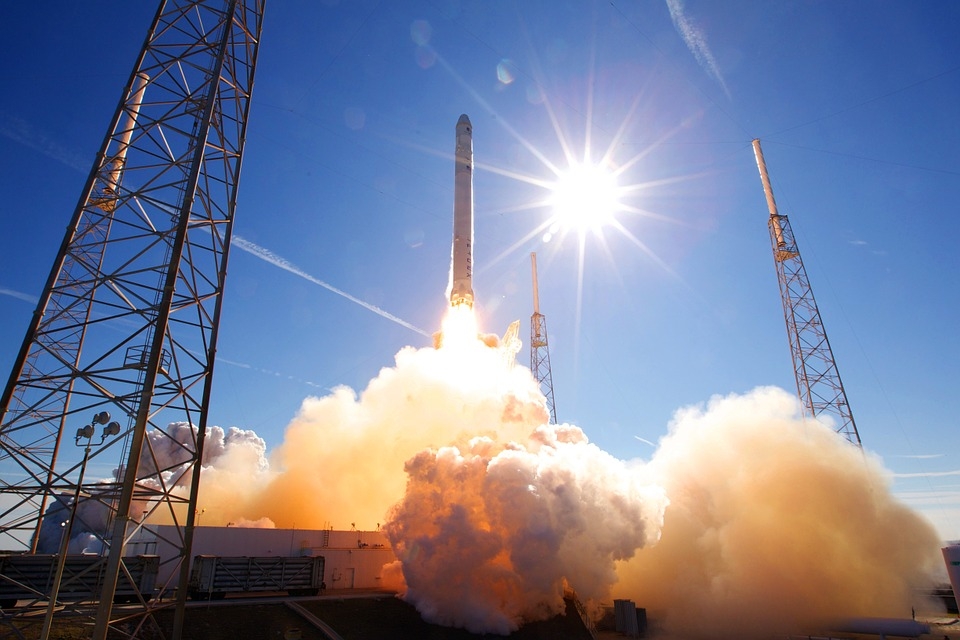Rocket Launch Schedule that took place in February 2022
8th Mar 2022
The rocket launch schedule for February 2022 was a bit more active than January which had its holiday season delays. In January, we only saw eight launches out of the planned twenty. Space X has opened an account for launches this year and is still confidently leading with four missions. Two more were held by China and one each by ULA and Virgin Orbit. And even though February is the shortest month of the year, Nextspaceflight.com notifies about 23 missions. Let’s see who made some noise.
1 February. SpaceX Falcon 9 Block 5 | Starlink Group 4-7
SpaceX sent another batch of 49 satellites for the Starlink global satellite communication system to LEO. The launch of Falcon 9 from the Kennedy Space Center was scheduled for 18:56 UTC. Weather permitting, the flight could be observed from central and southeastern Florida. The first stage was expected to land on the floating autonomous platform “A Shortfall of Gravitas” east of the Bahamas. As a reminder, SpaceX successfully tested the platform on 6th January. In addition, the company planned four more Starlink launches in February: three from Cape Canaveral and one from the Vandenberg base in California.
2 February. SpaceX Falcon 9 Block 5 | NROL-87
This time the Falcon 9 launch a payload (probably spy satellites) to the SSO for the National Reconnaissance Office as part of the NROL-87 mission. The launch took place from Vandenberg Air Force Base SLC-4. The Falcon’s first stage landed at the launch site in about eight minutes.
3,19 February. Roscosmos Soyuz 2.1a | Neutron, Progress MS-19
The Soyuz launch vehicle in 2.1a modification with the Fregat upper stage delivered the Russian military reconnaissance optical satellite Neutron to LEO. The launch was scheduled for 07:00 UTC from the Plesetsk cosmodrome.
And on February 19, Roscosmos sends another MC-19 Progress supply ship to LEO, which delivered almost 2.5 tons of cargo to the ISS. Soyuz 2.1 will planned to take off at 04:25 UTC from the Baikonur Cosmodrome in Kazakhstan.
5 February. Astra Rocket 3 | VCLS Demo-2A
American company Astra Space tried for the second time to successfully launch Astra Rocket 3 with six experimental CubeSats developed by NASA and US universities under the Educational Launch of Nanosats (ELaNa) 41NASA program. The launch was scheduled from Cape Canaveral at 18:00 UTC. The mission has been postponed since January 18th and this time the launch was postponed again to 10th February, eventually failing after a technical anomaly.
10 February. Arianespace. Soyuz ST-B/Fregat-MT | OneWeb #13
The 13th mission for the British operator, OneWeb, global communications network deployment program, scheduled for the demonstration launch this year. The Russian Soyuz launch vehicle with the Fregat upper stage launched 32 spacecraft weighing 147.7 kg into orbit, which will provide communication with ground antennas at a speed of up to 50 Mbps.
Importantly, the OneWeb satellites are designed to prevent space debris accumulation. They are equipped with a system for de-orbiting and re-entering the Earth’s atmosphere 25 years after decommissioning. The Soyuz rocket launch was scheduled for 18:09 UTC from the spaceport in French Guiana.
14 February. Rocket Lab Electron/Curie | Without Mission a Beat
Last year, and then in January, Rocket Lab did not manage to complete the two remaining Earth Observation missions under a contract with the American company BlackSky. Launcher rectified the situation in February. The Electron light rocket launch was scheduled for 00:55 UTC from Rocket Lab LC-1A in Mahia, New Zealand.
The carrier put a 112 kg payload into orbit ─ the BlackSky 16 and 17 micro-Earth observation satellites, belonging to the second generation of satellites with improved solar panels and image processing equipment.
14 February ISRO PSLV-XL | EOS-04
India does not lose hope to launch its own radar satellite EOS-04 (RISAT) into a sun-synchronous orbit. According to reports, the 1858-kg spacecraft will be used for all-weather reconnaissance. The PSLV-XL rocket developed by the Indian Space Research Organization (ISRO) delivered the payload.
The launch from the Satish Dhawan Space Centre on the Indian island of Sriharikota has been delayed since December.
19 February. Northrop Antares 230+ | CRS NG-17
Another ISS resupply mission, this time from the American Northrop Grumman. It delivered 6,600 kg of payload to the ISS using the transport system, which includes the Cygnus cargo ship and the Antares launch vehicle.
The rocket was scheduled to launch at 17:39 UTC from LP-0A in Virginia, USA.
February China CentiSpace-1 S3, LongMarch 6A Demoflight & Others
China, as usual, has grand plans. There were 9 Chinese missions in the February rocket launch schedule. ExSpace, a private Chinese company, planned a Kuaizhou-1A light vehicle to launch CentiSpace S3 at LEO. The small commercial satellite of the Beijing-based company Future Navigation is designed to test GNSS augmentation methods, including the laser inter-satellite link.
Also, ExSpace launched Kuaizhou-11 with a cluster payload to LEO, and CASC (China Aerospace Science and Technology Corporation) and Galactic Energy are planning 6 Earth observation missions. The demo flight of the first Chinese launch vehicle Long March 6A with solid propellant boosters stands apart. We add that this is the 24th modification of the Long March rocket family in China’s development since the late 1960s






Thank you for your comment! It will be visible on the site after moderation.